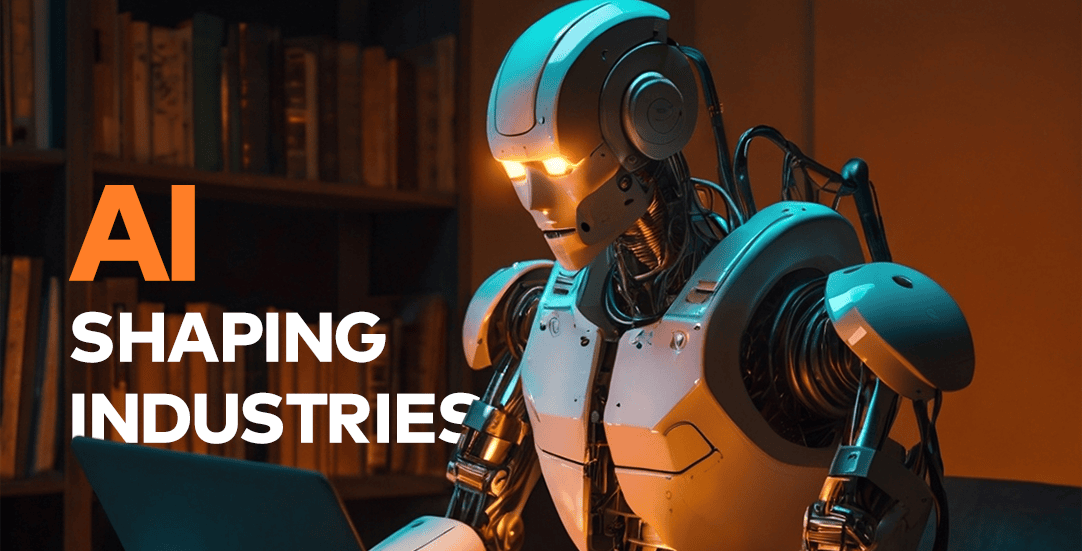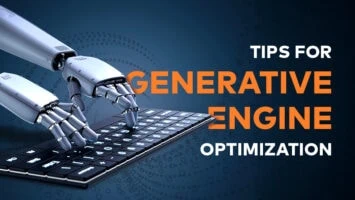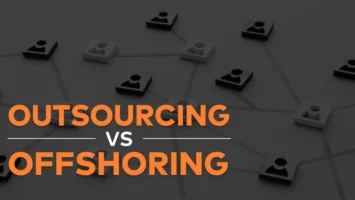The AI revolution – how artificial intelligence reshapes the industries of today

In an interview on the Joe Rogan Experience, Sam Altman, the CEO of Open AI speaks about how Artificial Intelligence will change our society during a natural course of technological progress. It’s a fascinating and enlightening discussion that gives hope for the future, but does not shy away from difficult topics and dark undertones. Whether we like it or not, AI is here to stay, and it has already propelled the development of many businesses, sometimes in clever and unexpected ways. In today’s article, we discuss how Artificial Intelligence empowers virtually all industries.
Applications of Artificial Intelligence
Different industries benefit from AI in different ways. Here are some examples of how various aspects of Artificial Intelligence aid modern businesses in their operations.
AI in Healthcare
AI algorithms and machine learning models can help analyze complex medical imaging, potentially catching early signs of diseases such as cancer, heart disease, and neurological disorders. AI can analyze large amounts of patient data to predict disease risk, provide customized treatment, and help with prevention and early intervention strategies. As in other industries, AI can help healthcare with administrative tasks, facilitating the organization of medical offices, helping with schedules, patient appointments and records, document processing, etc. AI-powered machines can assist with surgeries, reducing the risk of human error. Other, often portable devices, help with complex diagnostics, monitor patient vital signs, track their recovery process, and may alert both the patient and medical professionals if there are reasons for concern. Lastly, AI can help with simulations on a regional or global scale, providing important information on possible disease outbreaks, and supporting decision-making.
Marketing powered by AI
Marketing is a very broad category, and AI excels in a number of areas here. First of all – analytics. AI helps accumulate huge amounts of data of all kinds in a short time. This information can be used to predict customer behaviors and preferences, making it easier to prepare customized marketing messages, campaigns and email marketing, resulting in more traffic to eCommerce platforms and higher engagement rates. AI can help sort customers into distinct segments further facilitating targeted advertising. Furthermore, content creation is much easier. With the help of AI one can quickly create social media posts, ad texts, or even complex articles, freeing up human resources for other tasks, or simply reducing the time needed for content preparation. Another aspect is probably one that is most evident for internet users – targeted ads. AI can analyze user data and online behavior to serve highly targeted ads to individuals who are most likely to be interested in a product or service. This is why Facebook ads often tend to be so well tailored to our individual preferences and needs.
Human Resources
HR processes are much easier thanks to AI due to the many possibilities of automation. AI can automate much of the recruitment process, from sifting through resumes to identifying the best-fit candidates based on job requirements. AI-powered systems can conduct background checks, verify credentials, and perform other elements of candidate screening, reducing human error or bias. Once the initial stages of recruitment are completed, AI tools can guide new hires through onboarding processes, providing them with necessary information and answering common questions. This reduces the load on HR professionals and ensures that new employees have a consistent and well-organized introduction to the company. Speaking of organization, AI can personalize training programs, or analyze an employee’s performance to suggest suitable opportunities for further advancement. Lastly, a lot of documentation processing can be delegated to AI-powered tools, relieving resources and eliminating the potential for human error.
Artifical Intelligence for Retail
As with many other industries, AI greatly supports retail with organization. Inventory management and supply chain optimization are key. Here, Artificial Intelligence helps by analyzing sales information to predict trends, optimize stock levels, and help with demand forecasting. Better inventory management means lower storage costs and decreased risk of unexpected stock-outs. Supply chains are optimized by predicting future demand, suggesting the best routes for shipping, and identifying potential disruptions. AI saves time spent on price optimization as it can automatically analyze various factors like competitors’ pricing, demand, and supply, and set optimal pricing for goods to maximize profits and sales. By analyzing customer information and using predictive analysis, AI can suggest products based on preferences, leading to increased sales and improved customer experience. After all, most of us prefer to see tailor-made offers rather than products we find no use for. Combined with Virtual Reality, AI-tech provides virtual fitting rooms for clothes shops. As in other industries, AI-powered chatbots can serve as the first line of customer service, answering queries around the clock and providing instant responses.
Transportation
The prime example of the use of AI in transportation is autonomous vehicles. The technology has been in development for a long time but has exploded only recently. Complex AI systems are the driving force behind many autonomous vehicles, from self-driving cars to drones. The technology is used to analyze sensor data, make decisions about the vehicle’s route, and avoid accidents. However, it’s not just about the vehicles. Traffic management also benefits from AI, as it can analyze the environment in real-time and from various sources at once to optimize timings, suggest better routes, and predict or even manage traffic congestion. AI can be used to optimize public transportation. By analyzing passenger movement patterns, the technology can suggest better public transport routes and schedules. Fleet management is also made easier with AI. Similarly to public transportation, it can optimize routes and schedules, and it can also help manage fuel consumption and predict potential service disruptions. Services that take customers from point A to point B, such as Uber or Bolt, use AI to dynamically calculate pricing, optimize pick-up and drop-off locations, and match passengers to nearby vehicles. And then, there are numerous ways AI systems support railway operations and cargo and delivery logistics.
Military and AI
On October 10, 2023, The Association of United States Army (AUSA) conducted a very interesting panel on “The future of army aviation”. As it turned out, the US military is heavily involved in AI development in many key areas that are supposed to give US soldiers an edge on the modern battlefield. The Air Force is investigating possibilities of human-machine integration, with the eventual aim of having a single pilot in a 5th/6th generation fighter jet commanding a wing of unmanned aircraft to perform different tasks depending on battlefield conditions. This is all part of the US NGAD program – Next Generation Air Dominance, where AI is supposed to play an important role. Using Artificial Intelligence, the Air Force wants to reduce the need for staff – go down from a crew of 4 to 2 from 2 to 1 – and to automate processes wherever possible, relieving the burden from humans. AI is supposed to accumulate huge amounts of data and provide operators with the most accurate information for given battlefield conditions, improving time management, and allowing the soldier to make decisions faster, and with better effect. The military is also investigating possible ways of using AI for autonomous supply, looking for new and efficient ways to deliver equipment to warzones and other areas of interest.
Manufacturing
Manufacturing greatly benefits from AI in quality control, as AI-powered systems can detect defects faster and with higher accuracy than humans, leading to better product quality and a reduced number of refunds. The technology is also used in monitoring manufacturing equipment, allowing for timely maintenance, preventing unexpected downtimes, and improving operational efficiency and machine lifespan. AI helps optimize production processes, improving efficiency and reducing wastage. The costs of manufacturing largely depend on energy consumption. AI can improve manufacturing processes by optimizing energy usage, which reduces costs. Robots have been part of the manufacturing processes for many years and AI greatly increases the capabilities of these “synthetic workers”. The technology allows them to perform more complex tasks, and operate with increased precision, reducing the possibility of human errors.
AI can be very helpful in many businesses
Artificial Intelligence is already reshaping the way business is conducted, automating a lot of mundane tasks, and relieving staff from activities that require increased precision or vast amounts of time. With each passing month, businesses find new ways to effectively apply AI in everyday operations, and IT companies continue to provide increasingly complex solutions with new functionalities. AI has quickly become one of the most important and useful innovations, with a huge potential for the future. If you are looking for ways to streamline and automate processes in your projects, or if you are in need of a talented team of developers from a web development company to bring your idea to life – do not hesitate to contact us


















